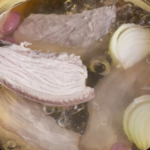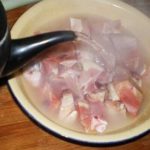1. Should you blanch meat in boiling water before cooking?
In order to have delicious and safe meals, housewives are very concerned about choosing clean and high-quality food. Many people advise that when buying pork, before cooking, it should be blanched in boiling water to remove harmful substances. Boiling water at high temperature will help eliminate viruses, harmful bacteria… But in fact, this practice does not remove the toxins and impurities from the meat, but also has negative effects on the consumer’s health.
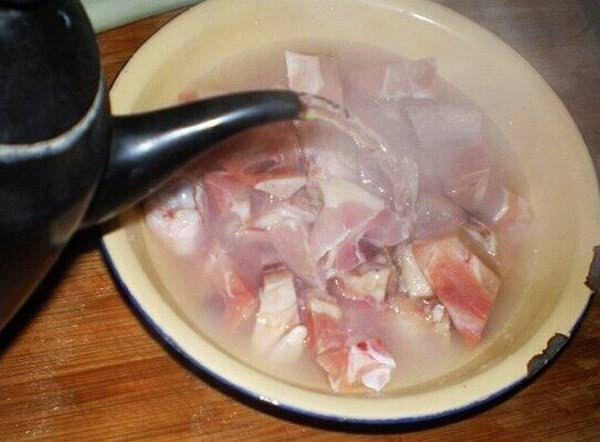
According to Assoc.Prof. Nguyen Duy Thinh, former lecturer at Hanoi University of Science and Technology, blanching meat in boiling water is an extremely mistaken habit of many housewives. Putting the meat in boiling water will cause the meat to contract. At high temperature, the surface proteins of the meat clump together, and any impurities or harmful substances inside cannot escape.
Therefore, you should only use boiling water to sterilize. If the meat is unfortunately contaminated, it can be thoroughly cooked to kill bacteria and make it safer to consume.
Instead of blanching the meat in boiling water, if you want to remove dirt and chemicals from the pork, the best way is to rinse it with clean water several times after buying it. Additionally, you can use salt or diluted salt water to massage the meat, then rinse it with clean water.
You can also soak the meat or bones in rice water for about 1 hour. This method is very effective in removing dirt on the surface of the ribs, excess blood in the meat and bone marrow, reducing the gamey smell, making the dish more delicious.
You can also put the bones or meat in a bowl of water with a little white vinegar, soak for about 15 minutes, then skim it out, rinse it thoroughly, and drain the water before cooking. Vinegar softens the meat and removes excess blood from the meat.
2. Proper way to clean pork
Clean pork with diluted salt water
Cleaning pork with diluted salt water is considered the standard way to clean pork. It can remove impurities inside.
You just need to prepare a basin of warm diluted salt water and soak the meat for about 10 – 15 minutes. At this time, the impurities from inside the meat will gradually be released. Then you rinse the meat again with water, then put the meat in cold water and slowly bring it to a boil. This will push any impurities inside out.
During the boiling process, if you see more foam floating on the boiled meat, it means that more impurities are being cleaned.
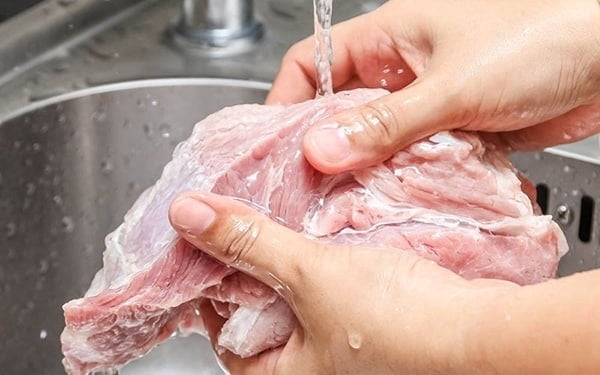
Soak pork in rice water
After washing rice, keep the rice water and use it to soak the meat. Rice water contains a lot of starch and amyloids – substances used to clean food and can remove impurities in pork. You should wash the meat before soaking it in rice water.
Soak the meat for about 20 minutes and you will see a lot of dirt floating on the surface of the rice water. At this time, bacteria and dirt have been pushed out.
Then wash the pork again with water to remove any dirt remaining on the surface of the meat.
After that, you can use a piece of lime to rub all over the surface of the meat and leave it for about 2-3 minutes, then rinse it with water.
Wash pork with vinegar
This method of washing pork is similar to soaking pork in rice water. The only difference is that this method uses vinegar instead of lime.
You prepare a clean basin, add a little salt and white vinegar, then rub directly on the pork with your hands. Do it for about 10 minutes. At this time, the dirt and blood in the pork will be released and completely cleaned.
These 3 ways to clean pork are very easy to do, so any housewife can do it. However, there is one method that is faster than all, which you can completely apply to easily clean pork, pork ribs.
3. Should you boil meat in boiling water or cold water?
Many people have the habit of boiling meat in cold water, but many others boil meat in hot water. So which method is delicious and beneficial for health?
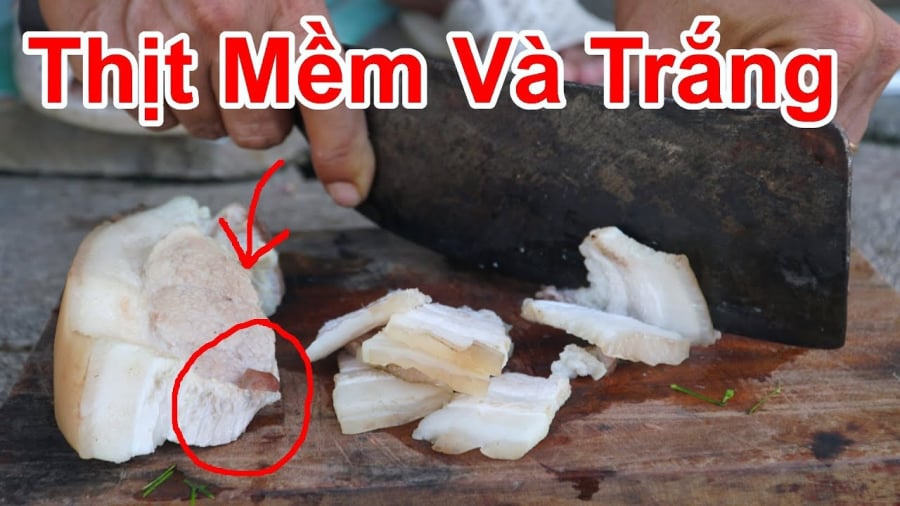
Meat boiled in boiling water will be sweeter than meat boiled in cold water. Because the meat retains nutrients and is not degraded due to over boiling. Although meat boiled in cold water is less flavorful, the broth from boiling meat is sweet and rich because the nutrients have been released into the water. This broth can be used to cook soup.
Therefore, choose the method of boiling meat according to your needs. During the cooking process, if you see foam or scum, you should use a spoon to skim it off.
To make the meat delicious and avoid the smell, you can add roasted dried onions or a little lemongrass when cooking.
























